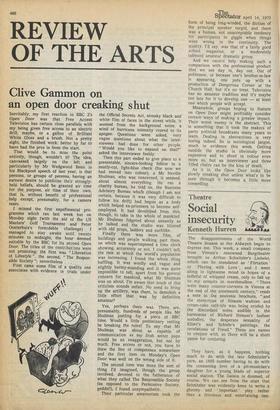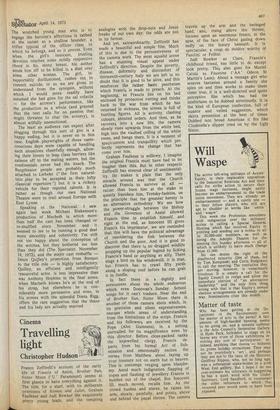Theatre
Social insecurity
Kenneth Hurren
The disappointments of the World Theatre Season at the Aldwych begin to depress me. This week, a small company from Vienna's renowned Burgtheater brought us Arthur Schnitzler's Liebelei, which can be translated as 'Flirtation ' or 'Playing with Love ', and I went along in lightsome mood in hopes of a ladleful of whipped cream, only to fall up to my armpits in marshmallow. "There were many counter-currents in Vienna at the end of the nineteenth century," reads a note in ene souvenir brochure, "and the sterectype of Strauss waltzes and cream-cake cafe-life was being eroded by the discordant notes audible in the harmonies of Richard Strauss's lushest melodies, the desperate sexuality of Klimt's and Schiele's paintings, the revelations of Freud." These are names to conjure with, so there will be a short pause for conjuring.
They have, as it happens, nothing much to do with the late Sohnitzler's yarn, an 1895 number having to do with the consuming love of a pit-musician's daughter for a young blade of superior social station. The liaison is doomed, of course. We can see from the start that Schnitzler was evidently keen to write a gloomy and ' important ' play rather than a frivolous and entertaining one. The wretched young man who is to engage the heroine's affections is tabbed at the outset as a shallow bounder, a trifler typical of the officer class. to Which he belongs, and so it proves. Even when the girl's innocent, trusting devotion touches some mildly responsive Chord in his stony breast, his author sends him off to be killed in a duel over some other woman. The girl, insupportably disillusioned, rushes out to commit suicide; or so we are given to understand from the synopsis, without Which I would more readily have assumed she had gone for the sal volatile -for the actress's performance, like the production as a whole (and granted that the text calls for no passion that might threaten to char the scenery), is almost wilfully unemotional.
The least an audience can expect after Slogging through this sort of goo is a happy ending, but it is never on in this case. English . playwrights of those casteconscious days were capable of handling such situations cheerfully enough, allowing their lovers to leap class barriers like salmon off to the mating waters, but the continentals never had the knack. The Burgtheater people are probably much attached to Liebelei (" the first naturalistic play to be accepted in their lofty classical repertoire ") but it is a rickety vehicle for their reputed talents. It is rather as though our own National Theatre were to trail around Europe with East Lynne.
Speaking of the 'National,' I saw again last week Michael Blakemore's production of Macbeth in which more than half the cast has been changed or re-shuffled since November. and it seemed to me to be running a good deal more smoothly and cohesively. I'm still not too happy about the conception of the witches, but they bothered me less than they did (The Spectator, November 18, 1972), and the major cast reshuffle — Denis Quiiley's promotion from Banquo to the title role — is highly satisfactory. Quilley, an efficient and intelligently resourceful actor, is less impressive than was Anthony Hopkins in the final scene, when Macbeth knows he's at the end of his strap, but elsewhere he is considerably more persuasive and even, in his scenes with the splendid Diana Rigg, offers the rare suggestion that the thane and his lady are actually married.



































 Previous page
Previous page